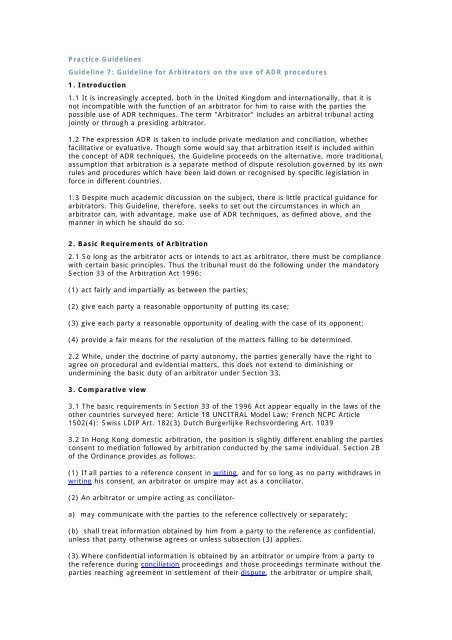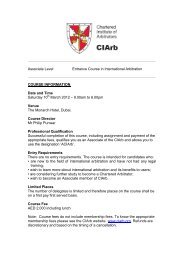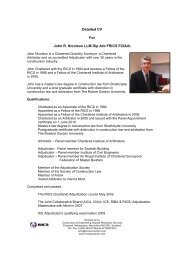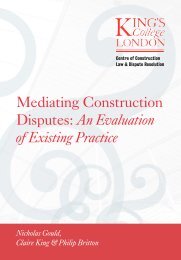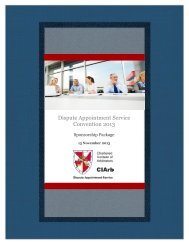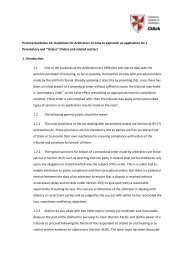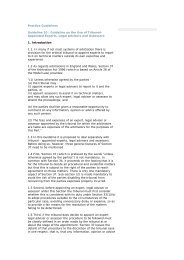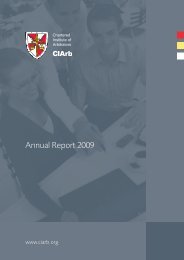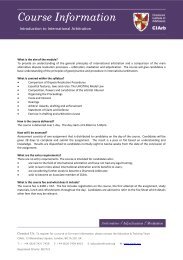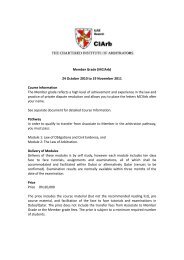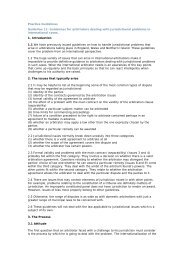Guideline for Arbitrators on the use of ADR procedures 1 ...
Guideline for Arbitrators on the use of ADR procedures 1 ...
Guideline for Arbitrators on the use of ADR procedures 1 ...
Create successful ePaper yourself
Turn your PDF publications into a flip-book with our unique Google optimized e-Paper software.
Practice <str<strong>on</strong>g>Guideline</str<strong>on</strong>g>s<str<strong>on</strong>g>Guideline</str<strong>on</strong>g> 7: <str<strong>on</strong>g>Guideline</str<strong>on</strong>g> <str<strong>on</strong>g>for</str<strong>on</strong>g> <str<strong>on</strong>g>Arbitrators</str<strong>on</strong>g> <strong>on</strong> <strong>the</strong> <strong>use</strong> <strong>of</strong> <strong>ADR</strong> <strong>procedures</strong>1. Introducti<strong>on</strong>1.1 It is increasingly accepted, both in <strong>the</strong> United Kingdom and internati<strong>on</strong>ally, that it isnot incompatible with <strong>the</strong> functi<strong>on</strong> <strong>of</strong> an arbitrator <str<strong>on</strong>g>for</str<strong>on</strong>g> him to raise with <strong>the</strong> parties <strong>the</strong>possible <strong>use</strong> <strong>of</strong> <strong>ADR</strong> techniques. The term "Arbitrator" includes an arbitral tribunal actingjointly or through a presiding arbitrator.1.2 The expressi<strong>on</strong> <strong>ADR</strong> is taken to include private mediati<strong>on</strong> and c<strong>on</strong>ciliati<strong>on</strong>, whe<strong>the</strong>rfacilitative or evaluative. Though some would say that arbitrati<strong>on</strong> itself is included within<strong>the</strong> c<strong>on</strong>cept <strong>of</strong> <strong>ADR</strong> techniques, <strong>the</strong> <str<strong>on</strong>g>Guideline</str<strong>on</strong>g> proceeds <strong>on</strong> <strong>the</strong> alternative, more traditi<strong>on</strong>al,assumpti<strong>on</strong> that arbitrati<strong>on</strong> is a separate method <strong>of</strong> dispute resoluti<strong>on</strong> governed by its ownrules and <strong>procedures</strong> which have been laid down or recognised by specific legislati<strong>on</strong> in<str<strong>on</strong>g>for</str<strong>on</strong>g>ce in different countries.1.3 Despite much academic discussi<strong>on</strong> <strong>on</strong> <strong>the</strong> subject, <strong>the</strong>re is little practical guidance <str<strong>on</strong>g>for</str<strong>on</strong>g>arbitrators. This <str<strong>on</strong>g>Guideline</str<strong>on</strong>g>, <strong>the</strong>re<str<strong>on</strong>g>for</str<strong>on</strong>g>e, seeks to set out <strong>the</strong> circumstances in which anarbitrator can, with advantage, make <strong>use</strong> <strong>of</strong> <strong>ADR</strong> techniques, as defined above, and <strong>the</strong>manner in which he should do so.2. Basic Requirements <strong>of</strong> Arbitrati<strong>on</strong>2.1 So l<strong>on</strong>g as <strong>the</strong> arbitrator acts or intends to act as arbitrator, <strong>the</strong>re must be compliancewith certain basic principles. Thus <strong>the</strong> tribunal must do <strong>the</strong> following under <strong>the</strong> mandatorySecti<strong>on</strong> 33 <strong>of</strong> <strong>the</strong> Arbitrati<strong>on</strong> Act 1996:(1) act fairly and impartially as between <strong>the</strong> parties;(2) give each party a reas<strong>on</strong>able opportunity <strong>of</strong> putting its case;(3) give each party a reas<strong>on</strong>able opportunity <strong>of</strong> dealing with <strong>the</strong> case <strong>of</strong> its opp<strong>on</strong>ent;(4) provide a fair means <str<strong>on</strong>g>for</str<strong>on</strong>g> <strong>the</strong> resoluti<strong>on</strong> <strong>of</strong> <strong>the</strong> matters falling to be determined.2.2 While, under <strong>the</strong> doctrine <strong>of</strong> party aut<strong>on</strong>omy, <strong>the</strong> parties generally have <strong>the</strong> right toagree <strong>on</strong> procedural and evidential matters, this does not extend to diminishing orundermining <strong>the</strong> basic duty <strong>of</strong> an arbitrator under Secti<strong>on</strong> 33.3. Comparative view3.1 The basic requirements in Secti<strong>on</strong> 33 <strong>of</strong> <strong>the</strong> 1996 Act appear equally in <strong>the</strong> laws <strong>of</strong> <strong>the</strong>o<strong>the</strong>r countries surveyed here: Article 18 UNCITRAL Model Law; French NCPC Article1502(4): Swiss LDIP Art. 182(3) Dutch Burgerlijke Rechsvordering Art. 10393.2 In H<strong>on</strong>g K<strong>on</strong>g domestic arbitrati<strong>on</strong>, <strong>the</strong> positi<strong>on</strong> is slightly different enabling <strong>the</strong> partiesc<strong>on</strong>sent to mediati<strong>on</strong> followed by arbitrati<strong>on</strong> c<strong>on</strong>ducted by <strong>the</strong> same individual. Secti<strong>on</strong> 2B<strong>of</strong> <strong>the</strong> Ordinance provides as follows:(1) If all parties to a reference c<strong>on</strong>sent in writing, and <str<strong>on</strong>g>for</str<strong>on</strong>g> so l<strong>on</strong>g as no party withdraws inwriting his c<strong>on</strong>sent, an arbitrator or umpire may act as a c<strong>on</strong>ciliator.(2) An arbitrator or umpire acting as c<strong>on</strong>ciliator-a) may communicate with <strong>the</strong> parties to <strong>the</strong> reference collectively or separately;(b) shall treat in<str<strong>on</strong>g>for</str<strong>on</strong>g>mati<strong>on</strong> obtained by him from a party to <strong>the</strong> reference as c<strong>on</strong>fidential,unless that party o<strong>the</strong>rwise agrees or unless subsecti<strong>on</strong> (3) applies.(3) Where c<strong>on</strong>fidential in<str<strong>on</strong>g>for</str<strong>on</strong>g>mati<strong>on</strong> is obtained by an arbitrator or umpire from a party to<strong>the</strong> reference during c<strong>on</strong>ciliati<strong>on</strong> proceedings and those proceedings terminate without <strong>the</strong>parties reaching agreement in settlement <strong>of</strong> <strong>the</strong>ir dispute, <strong>the</strong> arbitrator or umpire shall,
e<str<strong>on</strong>g>for</str<strong>on</strong>g>e resuming <strong>the</strong> arbitrati<strong>on</strong> proceedings, disclose to all o<strong>the</strong>r parties to <strong>the</strong> referenceas much <strong>of</strong> that in<str<strong>on</strong>g>for</str<strong>on</strong>g>mati<strong>on</strong> as he c<strong>on</strong>siders is material to <strong>the</strong> arbitrati<strong>on</strong> proceedings.(4) No objecti<strong>on</strong> shall be taken to <strong>the</strong> c<strong>on</strong>duct <strong>of</strong> arbitrati<strong>on</strong> proceedings by an arbitratoror umpire solely <strong>on</strong> <strong>the</strong> ground that he had acted previously as a c<strong>on</strong>ciliator in accordancewith this secti<strong>on</strong>.”4. Facilitative Mediati<strong>on</strong>/C<strong>on</strong>ciliati<strong>on</strong>4.1 The essence <strong>of</strong> <strong>the</strong>se processes is that <strong>the</strong> mediator or c<strong>on</strong>ciliator endeavours topromote an agreed settlement <strong>of</strong> <strong>the</strong> dispute or <strong>of</strong> issues within <strong>the</strong> dispute. No particulardifficulty arises where an arbitrator attempts to promote an agreed settlement withoutmeeting with <strong>on</strong>e party in <strong>the</strong> absence <strong>of</strong> <strong>the</strong> o<strong>the</strong>r and without receiving in<str<strong>on</strong>g>for</str<strong>on</strong>g>mati<strong>on</strong> from<strong>on</strong>e party which is not also given to <strong>the</strong> o<strong>the</strong>r. For example, it is very comm<strong>on</strong> <str<strong>on</strong>g>for</str<strong>on</strong>g>arbitrators to direct <strong>the</strong> parties to seek to agree "figures as figures" or to give specificdirecti<strong>on</strong>s <str<strong>on</strong>g>for</str<strong>on</strong>g> experts to meet and to report up<strong>on</strong> matters <strong>of</strong> agreement and disagreement.4.2 Nor is <strong>the</strong>re any <strong>the</strong>oretical difficulty in <strong>the</strong> arbitrator holding what may be called a"settlement c<strong>on</strong>ference" at which all parties are present. The c<strong>on</strong>ference can be directedtowards enabling <strong>the</strong> parties to settle particular issues or even <strong>the</strong> whole dispute. Timinghowever is all important. Such a c<strong>on</strong>ference may achieve little unless <strong>the</strong> parties are<strong>the</strong>mselves moving towards an agreement when <strong>the</strong> interventi<strong>on</strong> <strong>of</strong> <strong>the</strong> arbitrator cansometimes help to bridge any gap.4.3 In any such discussi<strong>on</strong>s <strong>the</strong> arbitrator may <strong>use</strong> <strong>ADR</strong> techniques to promote agreement.These may include appealing to <strong>the</strong> interests <strong>of</strong> <strong>on</strong>e or both parties in reaching a n<strong>on</strong>adversarialoutcome to <strong>the</strong> dispute, in avoiding <strong>the</strong> fur<strong>the</strong>r expenditure <strong>of</strong> time and costs,and in preserving what remains <strong>of</strong> <strong>the</strong> commercial relati<strong>on</strong>ship. It can help if <strong>the</strong> principalsinvolved in <strong>the</strong> dispute (and not merely <strong>the</strong>ir representatives) are present at <strong>the</strong>c<strong>on</strong>ference.4.4 N<strong>on</strong>e <strong>of</strong> this need involve "caucusing" <strong>procedures</strong> or receiving in<str<strong>on</strong>g>for</str<strong>on</strong>g>mati<strong>on</strong> from <strong>on</strong>eparty which is unknown to <strong>the</strong> o<strong>the</strong>r. Nothing that has so far been said involves <strong>the</strong>arbitrator in departing from <strong>the</strong> "basic requirements <strong>of</strong> arbitrati<strong>on</strong>" referred to above.5. Evaluative Mediati<strong>on</strong>/C<strong>on</strong>ciliati<strong>on</strong>5.1 An arbitrator can also, subject to proper safeguards, assist <strong>the</strong> parties in evaluating<strong>the</strong> merits <strong>of</strong> <strong>the</strong> dispute. An arbitrator who attempts to promote settlement may be calledup<strong>on</strong> by <strong>on</strong>e side or <strong>the</strong> o<strong>the</strong>r to give a preliminary indicati<strong>on</strong> as to his present views <strong>on</strong><strong>the</strong> issues. In resp<strong>on</strong>se, an arbitrator may give an indicati<strong>on</strong> as to what in his view are <strong>the</strong>more important issues to be decided and as to which party appears to have <strong>the</strong> str<strong>on</strong>gercase <strong>on</strong> any issue. An arbitrator may properly take <strong>the</strong> initiative in doing this.5.2 As a general principle an arbitrator should <strong>on</strong>ly give an evaluati<strong>on</strong> <strong>of</strong> <strong>the</strong> merits <strong>of</strong> anyissue or dispute where (i) <strong>the</strong> parties agree to his doing so and (ii) <strong>the</strong> status <strong>of</strong> <strong>the</strong> "view"is clearly understood. The arbitrator should usually state that, <strong>on</strong> <strong>the</strong> issues in questi<strong>on</strong>,his mind remains open. If a view is given, it should be <strong>on</strong> <strong>the</strong> basis that <strong>the</strong> arbitrator isready and able to c<strong>on</strong>tinue with <strong>the</strong> case, in <strong>the</strong> absence <strong>of</strong> settlement.5.3 The arbitrator may give a view at any stage <strong>of</strong> <strong>the</strong> case. It is not necessary to waituntil both sides have presented <strong>the</strong>ir cases. For example, an arbitrator may serve <strong>the</strong>interests <strong>of</strong> <strong>the</strong> parties by indicating, at <strong>the</strong> end <strong>of</strong> <strong>the</strong> claimant's <str<strong>on</strong>g>for</str<strong>on</strong>g>mal case, that someaspects <strong>of</strong> it do not at that stage seem persuasive. The arbitrator must bear in mind that<strong>the</strong> parties will not <strong>the</strong>n have had an opportunity <strong>of</strong> putting <strong>the</strong>ir cases, but it is notobjecti<strong>on</strong>able to comment <strong>on</strong> <strong>the</strong> case which has been put. In general, an arbitrator shouldseek to avoid <strong>the</strong> extremes <strong>of</strong> <strong>on</strong> <strong>the</strong> <strong>on</strong>e hand, sitting passively throughout a hearingwithout displaying any reacti<strong>on</strong> and, <strong>on</strong> <strong>the</strong> o<strong>the</strong>r, <strong>of</strong> appearing to have made up his mindagainst <strong>on</strong>e <strong>of</strong> <strong>the</strong> parties prematurely.6. "Caucusing" Procedures
6.1 The inherent difficulty in an arbitrator making <strong>use</strong> <strong>of</strong> <strong>ADR</strong> techniques arises principallybeca<strong>use</strong> mediati<strong>on</strong> and c<strong>on</strong>ciliati<strong>on</strong> usually involve <strong>the</strong> mediator or c<strong>on</strong>ciliatorcommunicating separately with <strong>the</strong> parties. This may involve receiving in<str<strong>on</strong>g>for</str<strong>on</strong>g>mati<strong>on</strong> from<strong>on</strong>e party which is not to be communicated to <strong>the</strong> o<strong>the</strong>r. Whe<strong>the</strong>r <strong>the</strong> process is"facilitative" or "evaluative", such caucusing <strong>procedures</strong> are seen as an essential tool <strong>of</strong>successful mediati<strong>on</strong> and c<strong>on</strong>ciliati<strong>on</strong>.Under English arbitrati<strong>on</strong> law, "caucusing" is not generally available to an arbitrator whowishes to make <strong>use</strong> <strong>of</strong> <strong>ADR</strong> techniques to facilitate a settlement. There are two reas<strong>on</strong>s <str<strong>on</strong>g>for</str<strong>on</strong>g>this; <strong>on</strong>e practical, <strong>the</strong> o<strong>the</strong>r deriving from <strong>the</strong> mandatory nature <strong>of</strong> an arbitrator's duties.6.2 From a practical viewpoint, in order to preserve <strong>the</strong> status <strong>of</strong> arbitrator, <strong>the</strong>re wouldhave to be an agreement by <strong>the</strong> parties that, if <strong>the</strong> mediati<strong>on</strong> fails, all in<str<strong>on</strong>g>for</str<strong>on</strong>g>mati<strong>on</strong>imparted to <strong>the</strong> arbitrator by any party material to <strong>the</strong> arbitrati<strong>on</strong> would have to bedisclosed to <strong>the</strong> o<strong>the</strong>r party. In <strong>the</strong> light <strong>of</strong> this requirement parties may be less<str<strong>on</strong>g>for</str<strong>on</strong>g>thcoming in <strong>the</strong> mediati<strong>on</strong> process. The parties may also be c<strong>on</strong>cerned that <strong>the</strong>arbitrator might be influenced by what he has learned <strong>of</strong> <strong>the</strong> positi<strong>on</strong>s taken by <strong>the</strong> partiesin <strong>the</strong> negotiati<strong>on</strong>s.6.3 The legal objecti<strong>on</strong> to an arbitrator taking part in "caucusing" <strong>procedures</strong> arises from<strong>the</strong> mandatory duties <strong>of</strong> an arbitrator under Secti<strong>on</strong> 33 <strong>of</strong> <strong>the</strong> Arbitrati<strong>on</strong> Act 1996discussed above. While <strong>the</strong> arbitrati<strong>on</strong> statutes in <str<strong>on</strong>g>for</str<strong>on</strong>g>ce in some jurisdicti<strong>on</strong>s (e.g. H<strong>on</strong>gK<strong>on</strong>g) allow arbitrators to communicate separately with parties in aid <strong>of</strong> mediati<strong>on</strong>, Englisharbitrati<strong>on</strong> law c<strong>on</strong>tains no comparable provisi<strong>on</strong>. The difficult issue is as to whe<strong>the</strong>rhearing <strong>on</strong>e sides’ view in <strong>the</strong> absence <strong>of</strong> <strong>the</strong> o<strong>the</strong>r and without handing over anyin<str<strong>on</strong>g>for</str<strong>on</strong>g>mati<strong>on</strong> collected during caucusing prevents each party from having a reas<strong>on</strong>ableopportunity to put his case and deal with that <strong>of</strong> his opp<strong>on</strong>ent. If this is <strong>the</strong> case, <strong>the</strong>mandatory nature <strong>of</strong> Secti<strong>on</strong> 33 precludes a mediator who has c<strong>on</strong>ducted privatecaucusing with <strong>on</strong>e or both <strong>of</strong> <strong>the</strong> parties from acting subsequently as an arbitrator in <strong>the</strong>same case.7. Appointing an Independent Facilitator7.1 One way in which an arbitrator can safely make <strong>use</strong> <strong>of</strong> <strong>ADR</strong> techniques is to appoint,with agreement <strong>of</strong> <strong>the</strong> parties, an independent neutral to act as mediator or c<strong>on</strong>ciliator andto adjust <strong>the</strong> procedural time-table to allow <strong>the</strong> mediati<strong>on</strong> process to take place. Since <strong>the</strong>arbitrator does not take part in <strong>the</strong> mediati<strong>on</strong> process his independence is in no waycompromised and he remains available to act as arbitrator to <strong>the</strong> extent <strong>the</strong> mediati<strong>on</strong> failsto produce an agreed settlement. The role <strong>of</strong> mediator can also, if <strong>the</strong> parties so agree, beundertaken by a tribunal-appointed expert or single joint expert appointed by <strong>the</strong> parties.7.2 If <strong>the</strong> mediati<strong>on</strong> is successful <strong>the</strong> arbitrator may, if <strong>the</strong> parties so request, record <strong>the</strong>settlement in <strong>the</strong> <str<strong>on</strong>g>for</str<strong>on</strong>g>m <strong>of</strong> an agreed award (See Secti<strong>on</strong> 51(2) <strong>of</strong> <strong>the</strong> 1996 Act). TheTribunal should decline to do this if it suspects that <strong>the</strong> settlement is being <strong>use</strong>d to assistin <strong>the</strong> transmissi<strong>on</strong> <strong>of</strong> <strong>the</strong> proceeds <strong>of</strong> crime.7.3. If <strong>the</strong> mediati<strong>on</strong> is unsuccessful a problem may arise as to whe<strong>the</strong>r <strong>the</strong> costs <strong>of</strong> <strong>the</strong>parties in pursuing <strong>ADR</strong> <strong>procedures</strong>, toge<strong>the</strong>r with <strong>the</strong> charges <strong>of</strong> <strong>the</strong> mediator, can beincluded in <strong>the</strong> recoverable costs <strong>of</strong> <strong>the</strong> arbitrati<strong>on</strong>. Ra<strong>the</strong>r than allow this problem toremain unsolved it is generally preferable to encourage <strong>the</strong> parties to agree whenappointing <strong>the</strong> mediator that, if <strong>the</strong> mediati<strong>on</strong> should fail, <strong>the</strong> costs incurred in c<strong>on</strong>necti<strong>on</strong>with it will <str<strong>on</strong>g>for</str<strong>on</strong>g>m <strong>the</strong> part <strong>of</strong> <strong>the</strong> recoverable costs <strong>of</strong> <strong>the</strong> arbitrati<strong>on</strong>. Secti<strong>on</strong> 63(1) <strong>of</strong> <strong>the</strong>1996 Act allows such an agreement to be made.8. The Arbitrator/Mediator in practice8.1 For <strong>the</strong> reas<strong>on</strong>s explained above, <strong>the</strong> safest technique <str<strong>on</strong>g>for</str<strong>on</strong>g> <strong>the</strong> arbitrator is normally toencourage <strong>the</strong> parties to mediate outside <strong>the</strong> arbitrati<strong>on</strong> be<str<strong>on</strong>g>for</str<strong>on</strong>g>e an agreed mediator, ra<strong>the</strong>rthan <str<strong>on</strong>g>for</str<strong>on</strong>g> <strong>the</strong> arbitrator to engage in caucusing <strong>procedures</strong> or to receive c<strong>on</strong>fidentialin<str<strong>on</strong>g>for</str<strong>on</strong>g>mati<strong>on</strong> from <strong>on</strong>e party which is not communicated to <strong>the</strong> o<strong>the</strong>r.8.2 There are however some situati<strong>on</strong>s where an experienced arbitrator may excepti<strong>on</strong>allyc<strong>on</strong>sider that <strong>the</strong> potential benefit <strong>of</strong> engaging in caucusing <strong>procedures</strong> outweighs <strong>the</strong> risk.
It is <strong>the</strong>n important that <strong>the</strong> arbitrator should proceed in an agreed and transparentmanner, preferably arranging <str<strong>on</strong>g>for</str<strong>on</strong>g> <strong>the</strong> intended steps and <strong>procedures</strong> to be agreed between<strong>the</strong> parties and recorded in writing. Where <strong>the</strong> mediati<strong>on</strong> is successful, no problem <strong>of</strong>course arises. This risk will <strong>on</strong>ly materialise if <strong>the</strong> mediati<strong>on</strong> is unsuccessful, if <strong>the</strong>arbitrator <strong>the</strong>n resumes <strong>the</strong> arbitrati<strong>on</strong> and makes an award and if <strong>on</strong>e or o<strong>the</strong>r party <strong>the</strong>nchallenges <strong>the</strong> award <strong>on</strong> <strong>the</strong> ground <strong>of</strong> serious irregularity affecting <strong>the</strong> tribunal, <strong>the</strong>parties or <strong>the</strong> award (Secti<strong>on</strong> 68 <strong>of</strong> <strong>the</strong> 1906 Act). Since this risk cannot be whollydiscounted, it has to be emphasised that <str<strong>on</strong>g>for</str<strong>on</strong>g> an arbitrator to engage in caucusingtechniques requires c<strong>on</strong>siderable experience and does involve some degree <strong>of</strong> risk.8.3. In view <strong>of</strong> <strong>the</strong> potential risk, it is str<strong>on</strong>gly recommended that <strong>the</strong> parties adopt awritten agreement which sets out what shall occur if <strong>the</strong> mediati<strong>on</strong> should fail. Theagreement may embody terms <str<strong>on</strong>g>for</str<strong>on</strong>g>:(1) <strong>the</strong> parties expressly to waive any right <strong>of</strong> challenge to <strong>the</strong> award based <strong>on</strong> <strong>the</strong> <strong>use</strong> by<strong>the</strong> arbitrator <strong>of</strong> <strong>ADR</strong> <strong>procedures</strong>, or(2) <strong>the</strong> arbitrator not to proceed to act as arbitrator after failure <strong>of</strong> mediati<strong>on</strong> orc<strong>on</strong>ciliati<strong>on</strong> without a fresh agreement <strong>of</strong> <strong>the</strong> parties and <strong>the</strong> arbitrator.


